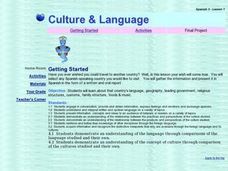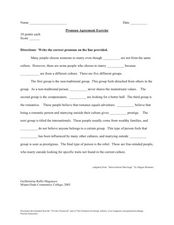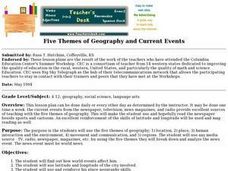Curated OER
Saving Bambi
Eighth graders read two articles about what is being done with deer dangers. They react to the stories read. They are reacting to if deer should be shot or not to help cut down on the many dangers they impose.
Curated OER
Portrait of a First Grader
First graders generate ideas of the things that a 1st Grade student thinks, does and feels based on a model on bulletin board paper. They (counselors) pick one students and trace that student's body onto a pieces of bulleting board paper...
Curated OER
I Did It!
Second graders choose a "positive work habit name" and explain why they choose the selected name. They share self-assessment information about their work habits and progress from week to week. Students respond with, "I did it" anytime...
Curated OER
The Many Roles I Play in My Community
Second graders are asked: "What roles do people have in the community?" They view a large web on chart paper. Students discuss the roles that they play in their community. They are told that just as the principal or teacher has many...
Curated OER
Getting Caught In The Web
Sixth graders brainstorm the ways a person's actions can affect a community. As a class, one classmate is given a ball of yarn and pass it along to another student creating a web. Next, some classmates are asked to drop their part and...
Curated OER
Rhythm
Fifth graders listen to a song from a compact disc called "Talking Spirits" and discuss whether they have ever heard music like that before and who might be playing the instruments and the music. They try to identify the instruments...
Curated OER
Partnership in Science Education
Students compare two regions of the world, their own and one many miles away. They explore and compare these two places and prepare a report that gives a complete comparison and description of the two regions. They collaborate in...
Curated OER
Treasures of the Silk Roads
Students examine and discuss art objects from the Silk Roads. They analyze images of artifacts, create a word map, and develop and write a short story or poem based on the slides viewed.
Curated OER
West African Art
Students engage in a lesson that is concerned with the concept of West African Art. They conduct research using a variety of resources. They focus upon the history, geography, economics, and political systems. The information is used to...
Curated OER
Spanish Country Report
Students select a Spanish-speaking country they would like to visit. They gather information and present it in Spanish in the form of a written and oral report.
Curated OER
Pronoun Agreement Exercise
In this pronoun agreement worksheet, students must fill in the blanks of a passage with the correct pronoun. Students read a passage on intercultural marriage and fill in the blanks.
Curated OER
Parenting - Discipline and Guidance
Students explain the role of discipline and guidance in their own lives and become better able to appropriately guide and discipline young Students.
Curated OER
Know Your Telephone
Young scholars describe the parts of a cell phone and role-play a phone call to a customer service representative. They compare/contrast the price of owning and using a cell phone in the U.S. and Venezuela.
Curated OER
The Trans Saharan Trade Route
In this trans Saharan trade route learning exercise, students respond to 6 short answer questions about African trade routes after they read the included article.
Curated OER
Credit as Currency: Ancient World History
Students examine use and principles of currency as it relates to the establishment and continuation of credit and banking systems.
Curated OER
Que te gusta comer? What Do You Like to Eat?
Eighth graders examine their preferences concerning foods, beverages and eating habits during different meals. A variety of exercises in listening, speaking, reading and writing will be provided to ensure that students discuss their...
Curated OER
Establishing a Global Perspective: Do Values Cross Borders?
Twelfth graders explore values in global perspectives. They discuss values in popular films and complete a timeline of their personal, societal, and key events. They design a photograph that reflects the concept of values. They create...
Curated OER
French: The Resistance and Occupation during World War II
Students in advanced French classes examine the French resistance during world War II. They discover what it was like living in an occupied country while increasing their vocabulary skills and applying the conditional verb tense....
Curated OER
Five Themes of Geography and Current Events
Basically, pupils look for a current world event from a reputable source and identify the five themes of geography within it. Throughout the school year, they keep a notebook of these current events. A grading guideline is outlined, and...
Curated OER
Fur Trade Economics
Learners demonstrate understanding of what the fur trade was and how it was operated, including the bartering process, by participating in a mock trade activity and assessing the value of items based on their needs and wants.
Curated OER
Trade in the Silk Road Cities
Students use Google Earth to map cities along the Silk Road trade route. In this Silk Road trading lesson, students complete a worksheet examining production, transportation, and value of goods and research trade items. Students create a...
Curated OER
United Nations Mini-Unit
Students demonstrate the ability to develop questions and ideas to initiate and refine research. They demonstrate the ability to conduct research and to answer questions and evaluate information and ideas. They design World Peace Flags.
Curated OER
Technology-commected Folklife Lesson Plan: Fables
Learners discuss ways the stories were alike and different. The teacher demonstrate how to draw a Venn diagram using Microsoft Word. They label the two circles and enter the likenesses and differences on the diagram.
Curated OER
Do Be Square
Second graders perform a square dance using proper movements keeping the beat and the rhythm of the song. They explore basic square dance steps as well as a complete dance. Give a bit of background on square dancing.

























